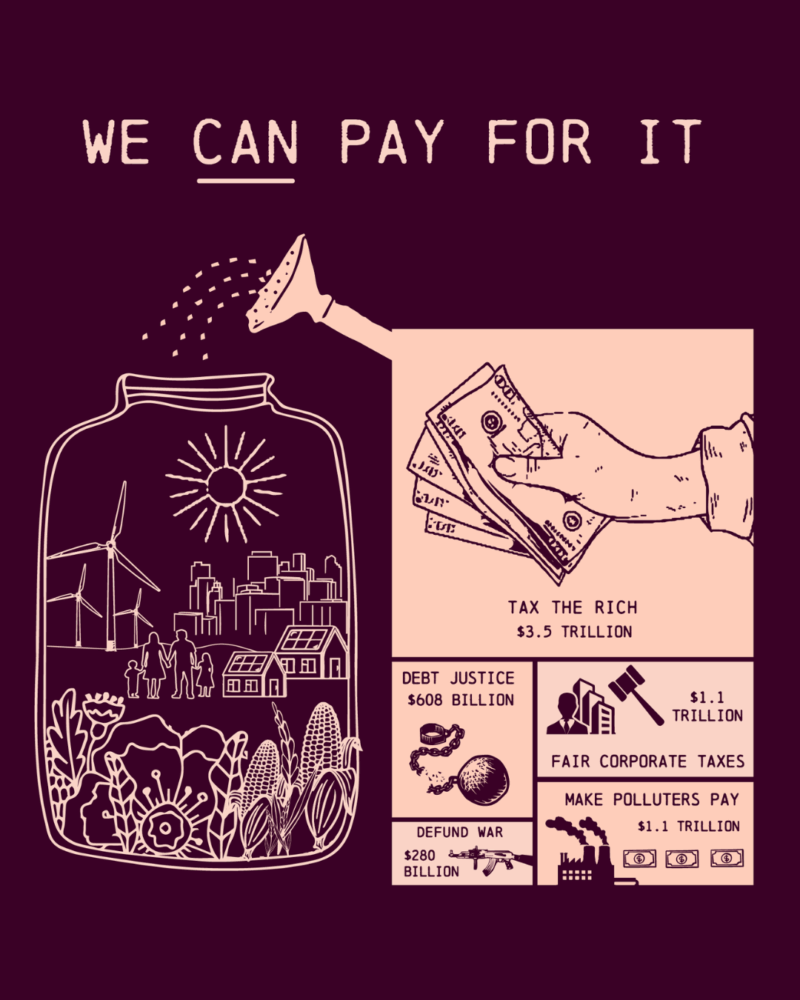
We Can Pay For It
Rich country leaders can unlock $6.6 trillion (USD) per year in public funding to pay their fair share for climate action at home and abroad. By ending fossil fuel handouts, making big polluters pay, and taxing the super rich, governments can raise the public money needed for a global just transition to renewables and other urgent needs from healthcare to housing.
Download the We Can Pay for It factsheet and the We Can Pay for It Leaflet that show exactly how rich countries can mobilize $6.6 trillion every year for climate action.
Download the Fact Sheet Download the Leaflet
The evidence is clear: we can pay for it. $6.6 trillion annually is up for grabs if rich governments end their billionaire handouts, fossil fuel subsidies, and transform unfair financial rules.
This fair, polluter-pays agenda would have a double impact towards a more equitable, climate-safe, and prosperous world: securing funding to address climate, social, and economic crises while also shifting wealth and power away from the actors like fossil fuel companies that are driving them.
If rich governments face up to their responsibilities as the biggest drivers of the climate crisis and implement key measures in their own countries, they can unlock:
- $3.5 trillion – increase taxes on the super rich
- $1.1 trillion – end fossil fuel handouts and tax fossil fuel exploration
- $1.1 trillion – set minimum corporate tax rates and close tax loopholes
- $608 billion – cancel unfair public debt payments and reform global debt rules
- $280 billion – cut ballooning public military budgets by 20%
Other key findings:
- In one year alone, from September 2024 to September 2025, our estimate of the funds that would be raised by Global North countries implementing the ‘We Can Pay For It’ policy package has grown by nearly a quarter (24%) from $5.3 to $6.6 trillion per year.
- Rich countries hold the key for many Global South countries to pursue these fair, polluter-pays measures to raise public funds because of their outsized control of global finance rules. If key financial architecture reforms are won to allow all countries to pursue this agenda, an additional $4.4 trillion per year could be unlocked annually.
In 2023 at COP28, governments committed to transition away from fossil fuels. Now, it’s time for rich countries to pay up to make a fossil free and climate safe world a reality. But the United Kingdom, Canada, United States, Australia, Norway and their peers say they cannot afford to pay their global fair share to do so. To evade their responsibility, the rich country governments that have done the most to cause the climate crisis have often put forward a ‘private-sector first’ approach to fund the just transition. Their claim that we can invest small sums of public finance to attract much larger private investments has been proven wrong repeatedly. We will need public funding and planning to lead the way.
The good news is that the urgency and extent of growing economic inequality, unfair sovereign debt crises, climate disasters, and fossil fuel profits has created significant momentum towards many of these measures. The factsheet details key examples where progress is underway, from domestic oil and gas windfall taxes to a United Nations debt convention.
